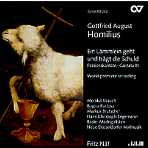When you hear this remarkable work you don’t have to know that Dresden church composer Gottfried August Homilius (1714-1785) was a pupil of J.S. Bach in order to be convinced of the great master’s influence. And when you realize this Passion Cantata’s composition date, 1775, you’re differently impressed: while Homilius offers some stylistic concessions to the latter 18th century–as in the chord-based, supportive role of the orchestra in the soprano aria “Getrost, mein Christ” and the homophonic structure of the chorus “Siehe, das ist Gottes Lamm”–the hand of Bach is never far from evident, as in the deliciously dark scoring of the bass arioso “Mir hast du Arbeit gemacht…”, the inventive orchestral figures against the solo melodies of many of the arias, and even in the manner of the chorale harmonizations.
But Homilius manages to deftly juxtapose these styles and create a work not only of considerable size–more than 90 minutes–but of sincerity and compelling affect. Homilius is ever conscious of the texts, which are not Biblical and do not concern the external dramatic episodes common to other Passion oratorios. Rather, they focus on more “contemplative” matters surrounding the event and meaning of Christ’s Passion. One of the more memorable moments comes with the tenor aria “Bewaffne dich…” (Arm yourself, mighty one, with terror and wrath), with its agitated melody and ferocious, rapid string tremolo figures. Another highlight is the beautiful and very Bach-like bass aria “Ich bete, zürnet nicht…” (I pray, do not rage, I am the man of sorrows). There’s also a nifty fugue in the chorus “Daran ist erschienen”. The truth is, all of the music is quite lovely and often powerful, as Homilius successfully sustains a serious mood while keeping us musically absorbed from beginning to end.
Choir and orchestra are absolutely first rate; the soloists, which are crucial to the performance as they have so much to do, are solid and technically more than capable, albeit with varying degrees of tonal quality and timbral appeal. I would have preferred a different tenor, one with a less quivery voice who didn’t strain in his upper register, although the former quality actually serves to heighten the effect in the abovementioned “Bewaffne dich” aria.
The sound, recorded at the Reformierte Kirche in Arlesheim, captures just the right “church acoustic” to complement the size of the forces while balancing the various components of soloists, chorus, and orchestra. On hearing such elegant, sophisticated, and immediately ingratiating music, you wonder how it could have been neglected for so long (this is a world-premiere recording); but you also understand why in his time and after his death Homilius was lauded as one of the greatest church composers. An enlightening and rewarding disc! [3/26/2007]
































